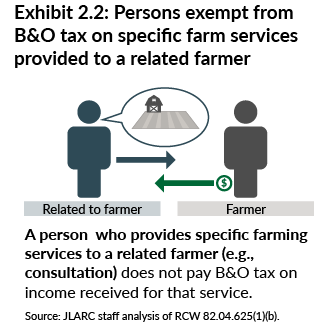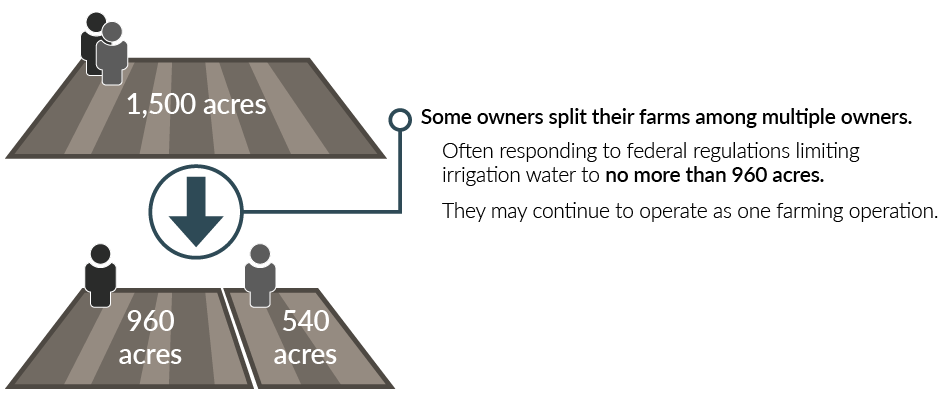Custom Farming
82.04.625
Exemptions—Custom farming services. (Expires December 31, 2020)
(1) This chapter does not apply to any:
(a) Person performing custom farming services for a farmer, when the person
performing the custom farming services is: (i) An eligible farmer; or (ii) at least
fifty percent owned by an eligible farmer; or
(b) Person performing farm management services, contract labor services, services
provided with respect to animals that are agricultural products, or any combination of
these services, for a farmer or for a person performing custom farming services, when
the person performing the farm management services, contract labor services, services
with respect to animals, or any combination of these services, and the farmer or
person performing custom farming services are related.
(2) The definitions in this subsection apply throughout this section.
(a)(i) "Custom farming services" means the performance of specific farming
operations through the use of any farm machinery or equipment, farm implement, or
draft animal, together with an operator, when: (i) [(A)] The specific farming
operation consists of activities directly related to the growing, raising, or
producing of any agricultural product to be sold or consumed by a farmer; and (ii)
[(B)] the performance of the specific farming operation is for, and under a contract
with, or the direction or supervision of, a farmer. "Custom farming services" does not
include the custom application of fertilizers, chemicals, or biologicals, or any
services related to the growing, raising, or producing of marijuana.
(ii) For the purposes of this subsection (2)(a), "specific farming operation"
includes specific planting, cultivating, or harvesting activities, or similar specific
farming operations. The term does not include veterinary services as defined in RCW
18.92.010; farrier, boarding, training, or appraisal services; artificial insemination
or stud services, agricultural consulting services; packing or processing of
agricultural products; or pumping or other waste disposal services.
(b) "Eligible farmer" means a person who is eligible for an exemption certificate
under RCW 82.08.855 at the time that the custom farming services are rendered,
regardless of whether the person has applied for an exemption certificate under RCW
82.08.855.
(c) "Farm management services" means the consultative decisions made for the
operations of the farm including, but not limited to, determining which crops to
plant, the choice and timing of application of fertilizers and chemicals, the
horticultural practices to apply, the marketing of crops and livestock, and the care
and feeding of animals. "Farm management services" does not include any services
related to the growing, raising, or producing of marijuana.
(d) "Related" means having any of the relationships specifically described in
section 267(b) (1), (2), and (4) through (13) of the internal revenue code, as amended
or renumbered as of January 1, 2007.
2014 c 140 § 10;2007 c 334 § 1.
Hauling agricultural products or machinery
RCW 82.16.300
Exemptions—Custom farming services. (Expires December 31, 2020)
(1) This chapter shall not apply to any person hauling agricultural products or farm
machinery or equipment for a farmer or for a person performing custom farming
services, when the person providing the hauling and the farmer or person performing
custom farming services are related.
(2) The exemption provided by this section shall not apply to the hauling of any
substances or articles manufactured from agricultural products. For the purposes of
this subsection, "manufactured" has the same meaning as "to manufacture" in RCW
82.04.120.
(3) The definitions in RCW 82.04.213 and 82.04.625 apply to this section.
2007 c 334 § 2.]
❮ Previous
Next ❯



 A person who performs specific
farming services does not pay B&O tax if they are
A person who performs specific
farming services does not pay B&O tax if they are 
